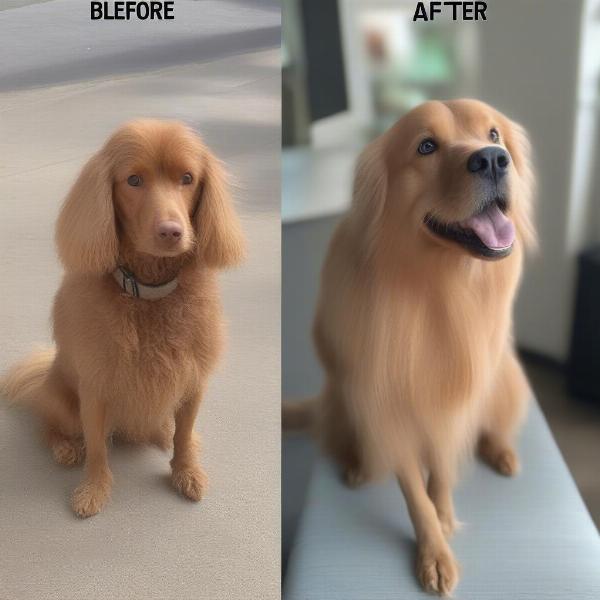Grain-free hypoallergenic dog food has become increasingly popular among pet owners seeking to address their dog’s food sensitivities or allergies. But is it the right choice for your furry friend? This guide delves into the world of grain-free hypoallergenic dog food, exploring its benefits, potential drawbacks, and how to choose the best option for your dog’s individual needs.
Understanding Grain-Free and Hypoallergenic Dog Food
What exactly does “grain-free” and “hypoallergenic” mean when it comes to dog food? Grain-free simply means the food doesn’t contain any grains like wheat, corn, rice, or barley. These are common allergens for some dogs. Hypoallergenic, on the other hand, refers to food formulated to minimize the risk of allergic reactions. It typically excludes common allergens like beef, chicken, dairy, and eggs, often replacing them with novel proteins like venison, duck, or kangaroo. It’s important to note that no dog food is truly 100% hypoallergenic as any ingredient can potentially trigger a reaction in a sensitive dog.
Benefits of Grain-Free Hypoallergenic Dog Food
For dogs with sensitivities, switching to a grain-free hypoallergenic diet can offer several benefits. It can help alleviate symptoms like itching, skin irritation, digestive upset, and ear infections. Many dogs also experience improved coat health and increased energy levels.
Dr. Emily Carter, DVM, a veterinary nutritionist, notes, “Grain-free hypoallergenic diets can be transformative for dogs struggling with food allergies. By removing common triggers, we can often see a significant improvement in their overall well-being.”
 Dog with Healthy Coat After Grain-Free Diet
Dog with Healthy Coat After Grain-Free Diet
Choosing the Right Grain-Free Hypoallergenic Dog Food
With so many options available, selecting the right grain-free hypoallergenic dog food can feel overwhelming. Consider your dog’s age, breed, activity level, and specific sensitivities. Look for foods with high-quality novel protein sources, digestible carbohydrates like sweet potato or pumpkin, and added vitamins and minerals. Always check the ingredient list carefully and avoid foods with artificial colors, flavors, or preservatives.
Potential Drawbacks and Considerations
While grain-free diets can be beneficial for some dogs, it’s crucial to be aware of potential drawbacks. Some grain-free diets have been linked to dilated cardiomyopathy (DCM) in dogs, although further research is ongoing. It’s important to consult with your veterinarian before switching your dog to a grain-free diet, especially if they have any underlying health conditions.
Is Grain-Free Hypoallergenic Dog Food Right for My Dog?
If your dog is experiencing allergy symptoms, switching to a grain-free hypoallergenic diet might be worth considering. However, a proper diagnosis from a veterinarian is crucial. They can perform tests to identify specific allergens and recommend the most appropriate diet for your dog.
Dr. Sarah Miller, DVM, adds, “Don’t self-diagnose. A vet can help pinpoint the cause of your dog’s symptoms and ensure they’re getting the right nutrition.”
Conclusion
Grain-free hypoallergenic dog food can be a valuable tool in managing food sensitivities and allergies in dogs. By understanding the benefits, potential drawbacks, and working closely with your veterinarian, you can make an informed decision about whether it’s the right choice for your furry companion. Choosing a high-quality, balanced grain-free hypoallergenic dog food can significantly improve your dog’s quality of life.
FAQs
- What are the most common signs of food allergies in dogs? Itching, skin irritation, digestive issues, and ear infections.
- Are all grain-free dog foods hypoallergenic? No, grain-free just means no grains. Hypoallergenic excludes common allergens.
- Can I switch my dog to a grain-free diet suddenly? It’s best to gradually transition to avoid digestive upset.
- Is grain-free dog food more expensive? Generally, yes, due to the specialized ingredients.
- How do I know if my dog needs a hypoallergenic diet? Consult with your veterinarian for proper diagnosis and recommendations.
- Are there any risks associated with grain-free diets? Some have been linked to DCM, although more research is needed. Talk to your vet.
- What should I look for in a high-quality grain-free hypoallergenic dog food? Novel protein sources, digestible carbohydrates, and no artificial ingredients.
Related Articles
ILM Dog is a leading international online resource dedicated to providing expert advice on dog care and nutrition. We offer comprehensive guides on various dog breeds, health concerns, training tips, and product recommendations. Our expertise covers a wide range of topics, from choosing the right dog breed to understanding their nutritional needs. For expert guidance tailored to your dog’s individual requirements, contact our team at [email protected] or +44 20-3965-8624. Visit ILM Dog for more information.